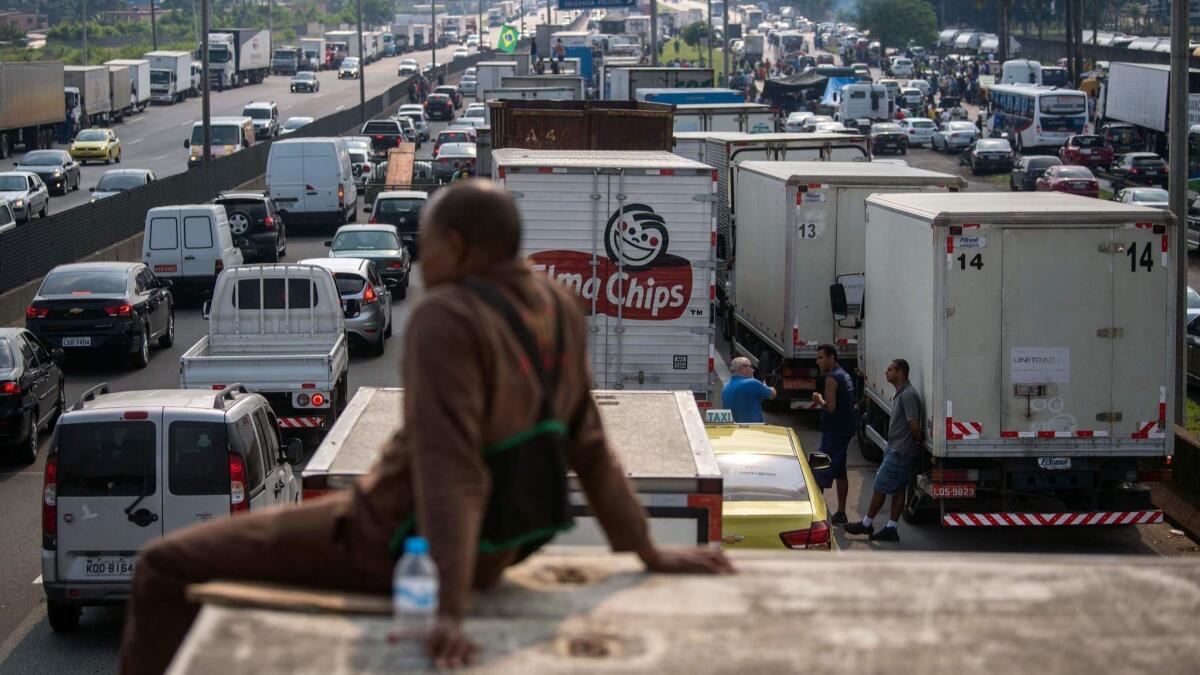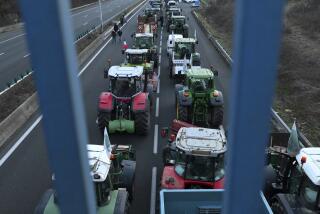Brazilian president sends in troops to remove blockages as truck strike paralyzes nation

President Michel Temer on Friday deployed federal forces to remove trucks blockading highways across the country after a five-day strike by truck drivers left supermarket shelves and gas stations empty, flights grounded and surgeries canceled.
Temer, who has asked state governors to follow his lead, held a “security evaluation” meeting with ministers Friday after what he called a “radical minority” of truckers continued to strike over diesel price hikes despite the government and several union leaders reaching a deal the night before that would suspend the strike for 15 days. The strike, which entered its fifth day Friday, has paralyzed much of the nation.
“We are not going to allow the population to run out of basic necessities. We will not allow hospitals to be left without supplies to save lives. We will not allow children to be harmed by school closures. We will not allow [rural] producers to have their work affected even more,” Temer said.
The truckers have parked their rigs, sometimes several deep, to completely or partially block hundreds of roads.
Brazilians who managed to get in hours-long lines to fill up at gas stations have faced even more severe traffic than usual, while public transportation in several cities is operating at a fraction of its normal capacity, leaving many residents unable to get to work. Paramedics have said they are rationing gas for ambulances.
Public schools and universities in several cities also shut their doors Friday, and garbage collection has come to a halt. Many supermarkets have put per-item limits in place as panic has led people to stockpile necessities.
“I know Temer said this will all end soon, but how can we be sure?” said Jacqueline Navarro, a retired teacher from Sao Paulo filling up a cart with rice, beans and toilet paper at a local store. “He’s never managed to do anything for us before. I doubt now will be any different.”
Truckers say rising diesel prices, which are increasing because of growing world oil prices and Brazil’s falling currency, have led to severe cuts to their income, making it impossible for them to make a living.
As part of Thursday’s accord, the government said it would fix diesel prices, which are usually adjusted daily, for 30 days. It also promised to lower several taxes, while state oil company Petrobras said Wednesday it would drop prices by 10% for the next two weeks.
But the Brazilian Truckers Assn., which represents some 700,000 of the country’s one million self-employed truck drivers, did not accept the government’s deal, though other unions did.
The association, also known as Abcam, said the number of highway blockades reached 521 on Friday, up from 402 the day before. Abcam also noted that it did not agree to the deal, but said it would pass along information to the truck drivers themselves, who are mostly independent.
The country’s economy has taken a hit since the long-haul trucks were parked on Monday, with carmakers due to stop production lines, several meat processing plants shutting down indefinitely and American Airlines flights from Miami to Brasília canceled. The nation’s centrally located capital of Brasília has suffered from shortages more than other cities because its fuel comes from the coast. Sao Paulo has declared a state of emergency, saying shortages could cause public calamity.
Brazil relies heavily on trucks to transport cargo, with its small network of railways mostly used for shipping raw materials. The strike comes as the country struggles to recover from one of its worst recessions, with unemployment refusing to drop and its currency on a steep decline.
UPDATES:
2:50 p.m.: This article was updated throughout with staff reporting and remarks from Michel Temer.
This article was originally published at 9:55 a.m.
More to Read
Start your day right
Sign up for Essential California for news, features and recommendations from the L.A. Times and beyond in your inbox six days a week.
You may occasionally receive promotional content from the Los Angeles Times.





